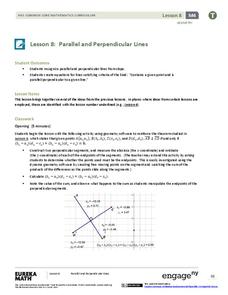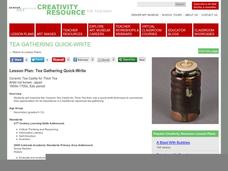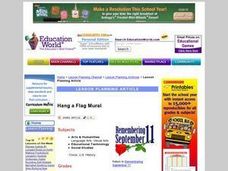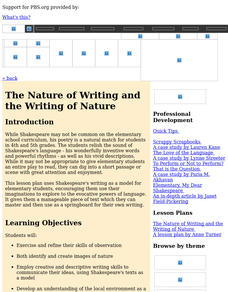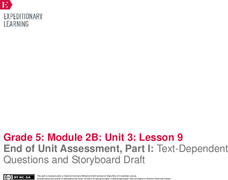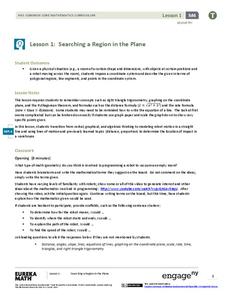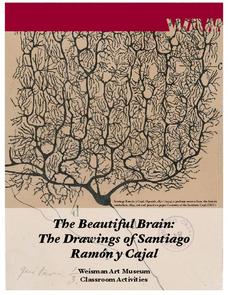EngageNY
Drafting Body Paragraphs
That's just the style. Learners begin with a mini-lesson about formal writing style. They then use what they learned about formal writing to begin the body paragraphs for their End of Unit 1 Assessment Prompt: Adversity in the Middle...
EngageNY
End of Unit Assessment: Final Essay
This is just the transition phase. Scholars participate in a mini lesson about using transitions in writing. They then have a brief peer critique of the introduction and conclusion paragraphs for their end of unit assessment. Learners...
EngageNY
Mid-Unit 3 Assessment, Part II: Organizing Notes for a Public Speech
It's all a matter of opinion! Pupils take Part II of the mid-unit assessment, in which they continue organizing their notes in preparation for writing an opinion speech. Using the resource, they add reasons, evidence, and a concluding...
EngageNY
Parallel and Perpendicular Lines
Use what you know about parallel and perpendicular lines to write equations! Learners take an equation of a line and write an equation of a line that is parallel or perpendicular using slope criteria. They then solve problems to...
Syracuse University
Women's Suffrage Movement
Women gained the right to vote in the twentieth century, but the fight for equality dates back centuries. Using an invitation to an 1874 suffrage convention, eager historians consider the motivations behind supporters of the suffrage...
Denver Art Museum
Tea Gathering Quick-Write
Japanese tea gatherings are the inspiration for a great lesson. Learners are provided with an image of a tea caddy made for thick tea and asked to describe what they notice and what that might mean. This leads into a larger lesson about...
NPR
Women Of Jamestown Lesson Plan
To better understand the role women played in early 17th century US history, class members examine the National Women's History Museum's online exhibit, Building the New World: the Women of Jamestown Settlement. After studying the 11...
EngageNY
Equations for Lines Using Normal Segments
Describing a line using an algebraic equation is an essential skill in mathematics. The previous instructional activity in the series challenged learners to determine if segments are perpendicular with a formula. Now they use the...
Curated OER
Direct Express
Although the game cards are not posted at this time, you could easily create some to put this plan into action. Simply write a few starting lines from different speeches on each index card, and have learners guess if the speaker's intent...
Curated OER
Some see art, some see vandalism
Students employ a wide range of strategies as they write and use different writing process elements appropriately to communicate with different audiences for a variety of purposes. Students conduct research on issues and interests by...
Curated OER
Hang a Flag Mural
Students create a mural that expresses their feelings and patriotism to honor the memory of those who gave their lives on September 11, 2001. They explore creative ideas to express their feelings on this subject through art or writing.
Curated OER
Shakespeare: The Nature of Writing and the Writing of Nature
This lesson plan uses Shakespeare's writing as a model for elementary students, encouraging them use their imaginations to explore to the evocative powers of language. It gives them a manageable piece of text which they can master and...
Curated OER
Where We Come From - A Culturally Responsive Writing Lesson
Learners create a group poem. In this poetry lesson, students make a cultural poem titled "We Come From." They share their poems using the document camera and SMARTboard.
Curated OER
Developing Flags
Learners examine why having a symbol such as a flag is important for countries. In this flag lesson, students break into groups and create their own flag to represent their group dynamic.
Curated OER
What Kind of Vessel Are You?
This is a strange question; but what kind of vessel would you be and why? After examining images of a large Inca jug, the class sets to writing a creative narrative that answers that very interesting question. They start by researching...
EngageNY
End of Unit Assessment, Part 1: Text-Dependent Questions and Storyboard Draft: “You Can Do a Graphic Novel” Excerpt
Eyes on the finish line. Serving as the first part of the end of unit assessment, learners answer questions based on a text about how to write a graphic novel. Using what they've learned, they then create a storyboard about the invention...
EngageNY
Searching a Region in the Plane
Programming a robot is a mathematical task! The activity asks learners to examine the process of programming a robot to vacuum a room. They use a coordinate plane to model the room, write equations to represent movement, determine the...
Curated OER
The Popcorn Book
Pop, pop, pop! Can you hear the sound popcorn makes when it's being made? Start the day by reading The Popcorn Book. Youngsters will love stringing together popcorn necklaces and learning about popcorn. There are separate prompts and...
University of Minnesota
Beautiful Brain: Strangest Dream
Do words change or add meaning or interest to a work of art? The final lesson in a four-part series on the beautiful brain as a work of art focuses on art analysis. Scholars write a story about exploring art from the inside. Reflections...
Brigham Young University
Out of the Dust: Guided Imagery
A guided imagery exercise is a great way to get readers thinking about writing. As part of their study of Out of the Dust, Karen Hesse’s 1998 Newbery Medal winning verse novel, class members listen to a reading of one of the poems...
Institute for Teaching through Technology and Innovative Practices
The Right Number of Elephants
How can you tell if a number of items is reasonable? Combine math and language arts with a fun lesson based on Jeff Shepard's The Right Number of Elephants. After reading the book, kids discuss amounts of other items and create...
Curated OER
Animal Diaries
Launch this instructional activity with Doreen Cronin's Diary of a Worm! Discuss the format and content of a diary, and ask learners if they've ever kept a diary before. Then, after an introductory discussion, have learners choose an...
EngageNY
How Do Dilations Map Angles?
The key to understanding is making connections. Scholars explore angle dilations using properties of parallel lines. At completion, pupils prove that angles of a dilation preserve their original measure.
Carolina K-12
Propaganda, Spin and Soundbite Politics
It's all about the spin! In an introduction to propaganda techniques and soundbite politics, scholars first learn about common propaganda techniques before seeing them in action in the context of the 2016 election cycle. Activities...



